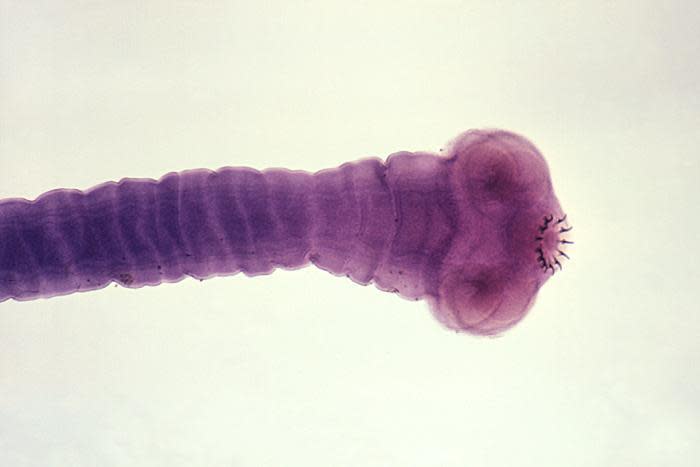RFK Jr. says he had a dead worm in his brain. What are these parasites and how common are they?

- Oops!Something went wrong.Please try again later.
- Oops!Something went wrong.Please try again later.
- Oops!Something went wrong.Please try again later.
Presidential candidate Robert F. Kennedy Jr. has made various claims about his health over the years, but the most shocking came Wednesday when it was revealed that Kennedy once insisted that a worm ate a portion of his brain over a decade ago.
Kennedy's assertion, which was reported by the New York Times, was made during divorce proceedings from his second wife, Mary Richardson Kennedy, and was intended to support his claim that health issues had reduced his earning potential.
Kennedy reportedly disclosed the ailment during a court deposition, saying that in 2010 he was experiencing memory loss and severe mental fogginess. He said he consulted with several neurologists who examined brain scans and suspected he had a brain tumor, and he was scheduled to undergo surgery.
But then a doctor at NewYork-Presbyterian Hospital told Kennedy he believed the scans revealed the remnants of a dead parasite.
The abnormality in his scans “was caused by a worm that got into my brain and ate a portion of it and then died,” the article reported Kennedy as saying in the 2012 deposition.
No medical proof has been offered to back up the candidate's claims, but the issue has prompted widespread conversation about the existence of brain worms, as well as the candidate's fitness for office.
Kennedy addressed the issue in a tongue-and-cheek post on X on Wednesday saying that he could "eat 5 more brain worms and still beat President Trump and President Biden in a debate." He added in another post, "I feel confident of the result even with a six-worm handicap."
There are several parasites that can do damage in the human brain, but the most common in the Americas is the pork tapeworm, Taenia solium. In the intestines, the worm can grow to 2 to 7 meters in length. Though its eggs can migrate from the intestines to tissues throughout the body, in all other organs the larvae die before reaching maturity.

Medical experts told The Times that the condition Kennedy described sounds like neurocysticercosis, a parasitic infection caused by the larval form of the pork tapeworm. Those doctors have not treated Kennedy and were speaking generally.
Depending on where the parasite lodges itself in or around the brain, the patient could either be entirely asymptomatic or experience headaches and seizures. Memory loss and cognitive problems of the kind Kennedy described in his deposition would be rare, said Dr. Edward Jones-Lopez, an infectious disease specialist with Keck Medicine of USC.
“It would be unusual for the parasite to cause memory loss just as an isolated symptom,” he said.
Kennedy’s description of the worm dying after it "ate a portion" of his brain is also a “misnomer” when speaking about neurocysticercosis, Jones-Lopez said. The parasite dies before maturing into an animal capable of eating anything.
The tapeworm’s eggs are found in the feces of an infected person, and they can spread to other hosts who consume food or water contaminated by the feces. If someone touches a contaminated surface and then puts their fingers in their mouth without washing their hands, they can ingest the eggs as well.
Once swallowed, the eggs find their way into skeletal muscles or other tissues, where they form cysts and cause the disease known as cysticercosis.
“In the brain it is actually [the larva] (not the mature worm itself) that forms cysts, which when surgeons excise and give to us pathologists, is often dead,” wrote Dr. William Yong, a pathologist specializing in neuropathology at UC Irvine. “They only form adult tapeworms in the intestines. Anywhere else in the body they form these larval cysts that ultimately die, degenerate and calcify.”
Read more: Brain tapeworm caused man's four-year headache
T. solium cysts can also enter the digestive system in contaminated pork that is raw or undercooked, causing a condition called taeniasis. The CDC estimates there are probably fewer than 1,000 cases a year, but it’s difficult to know for sure because infections typically result in nothing worse than mild digestive problems, such as abdominal pain or an upset stomach.
If the cysts find a home in the small intestine, they can develop into adult tapeworms in about two months’ time. Their eggs could then spread and cause neurocysticercosis.
Calcified evidence of past infections has been turning up on the brain scans of patients who’ve had imaging taken for other reasons, leading doctors to conclude that most cases of neurocysticercosis are either asymptomatic or produce only mild symptoms. A single patient could have hundreds of these calcifications in their brain, said Dr. Diana Vargas, a neurologist and neuroimmunologist at the Emory University School of Medicine.
The parasite is typically seen in underdeveloped countries where pigs come in contact with human feces, said Dr. Charles Bailey, the medical director for infection prevention at Providence St. Joseph and Providence Mission hospitals.
"It can go from the GI tract and has a propensity to migrate into the brain," Bailey said. "It can be asymptomatic until the parasite dies. Usually when it dies it triggers some local inflammatory response which causes swelling in that particular area that can lead to symptoms."
The parasite is endemic in Central and South America, as well as some areas of Asia and Africa, Vargas said. It isn't frequently seen in the United States, but there are still hundreds of hospitalizations per year, she said.
Bailey said in his four-decade career he's seen 10 to 12 cases, mostly from people who have lived in Latin America.
"Most of the cases I've seen have not been in travelers. They're people who have lived in that part of the world most or all of their life and for whom high-quality or fully cooked meat might not have been consistently available," Bailey said. "It's not something typical tourists should be concerned about."
Kennedy told the New York Times that doctors told him the cyst they saw on his scan contained the remains of a parasite. He was unsure where he might have contracted it, but suspected it could have been during a trip he took to South Asia. It did not require any treatment, he said.
Bailey said there's no need to remove the parasite surgically unless it's located in an area of the brain where it's causing problems. If it's discovered before it dies, it can be treated with oral anti-parasitic medications, usually along with steroids to control swelling and inflammation that could become life-threatening.
It can take anywhere from several months to up to four years for symptoms to develop, Vargas said.
Other types of parasites that can lodge in the brain include schistosoma, a flatworm that burrows through the skin but doesn’t form the signature cyst that neurocysticercosis does, or echinococcus, which can infect the brain but far more typically attacks the liver, Jones-Lopez said.
Compared to T. solium, the other parasites “are so extremely rare,” Vargas said.
Read more: Live tapeworm, 'still wiggling,' removed from California man's brain
The presidential candidate says that over the years he's suffered from atrial fibrillation — the most common type of heartbeat abnormality — mercury poisoning, hepatitis C from intravenous drug use in his youth and spasmodic dysphonia, a neurological disorder that causes his vocal cords to squeeze too close together.
Kennedy's campaign press secretary Stefanie Spear said in a statement to The Times that Kennedy traveled extensively in Africa, South America and Asia doing environmental advocacy work and "in one of those locations contracted a parasite."
"The issue was resolved more than 10 years ago, and he is in robust physical and mental health," she said. "Questioning Mr. Kennedy’s health is a hilarious suggestion, given his competition."
Kennedy, who is running to represent the American Independent Party, has been criticized for his extreme views and disinformation about vaccines.
In a podcast in 2021, Kennedy advised parents to "resist" the U.S. Centers for Disease Control and Prevention’s guidelines on vaccinating children. For years he has spread falsehoods about the effectiveness of vaccines and during a speech in 2022 said COVID-19 restrictions were something a totalitarian state would do, likening them to conditions in Nazi Germany.
Times staff writer Faith E. Pinho contributed to this report.
This story originally appeared in Los Angeles Times.

